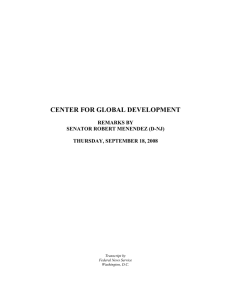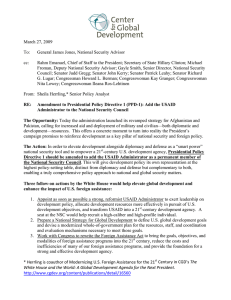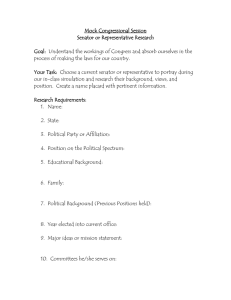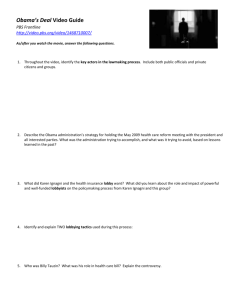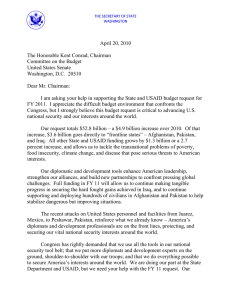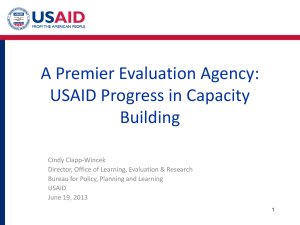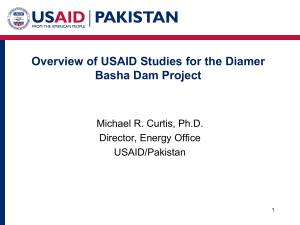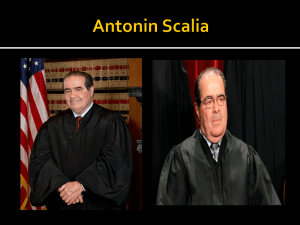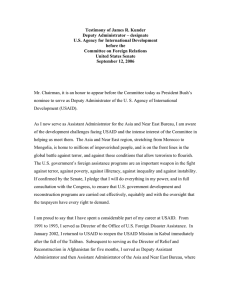Center for Global Development Event
advertisement
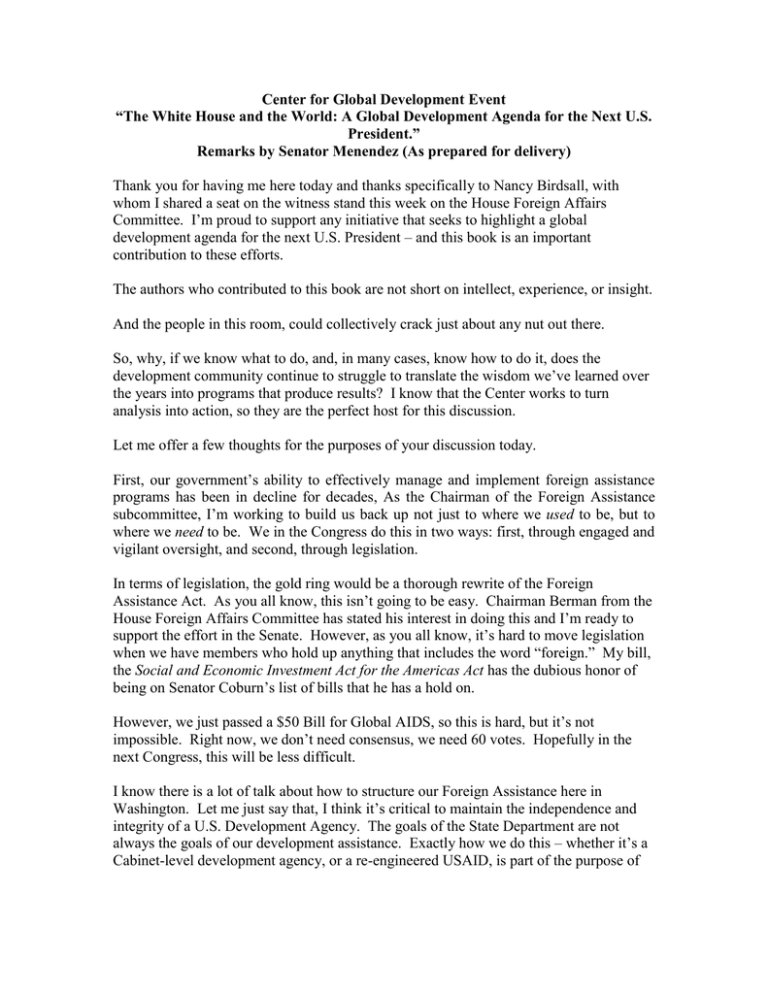
Center for Global Development Event “The White House and the World: A Global Development Agenda for the Next U.S. President.” Remarks by Senator Menendez (As prepared for delivery) Thank you for having me here today and thanks specifically to Nancy Birdsall, with whom I shared a seat on the witness stand this week on the House Foreign Affairs Committee. I’m proud to support any initiative that seeks to highlight a global development agenda for the next U.S. President – and this book is an important contribution to these efforts. The authors who contributed to this book are not short on intellect, experience, or insight. And the people in this room, could collectively crack just about any nut out there. So, why, if we know what to do, and, in many cases, know how to do it, does the development community continue to struggle to translate the wisdom we’ve learned over the years into programs that produce results? I know that the Center works to turn analysis into action, so they are the perfect host for this discussion. Let me offer a few thoughts for the purposes of your discussion today. First, our government’s ability to effectively manage and implement foreign assistance programs has been in decline for decades, As the Chairman of the Foreign Assistance subcommittee, I’m working to build us back up not just to where we used to be, but to where we need to be. We in the Congress do this in two ways: first, through engaged and vigilant oversight, and second, through legislation. In terms of legislation, the gold ring would be a thorough rewrite of the Foreign Assistance Act. As you all know, this isn’t going to be easy. Chairman Berman from the House Foreign Affairs Committee has stated his interest in doing this and I’m ready to support the effort in the Senate. However, as you all know, it’s hard to move legislation when we have members who hold up anything that includes the word ―foreign.‖ My bill, the Social and Economic Investment Act for the Americas Act has the dubious honor of being on Senator Coburn’s list of bills that he has a hold on. However, we just passed a $50 Bill for Global AIDS, so this is hard, but it’s not impossible. Right now, we don’t need consensus, we need 60 votes. Hopefully in the next Congress, this will be less difficult. I know there is a lot of talk about how to structure our Foreign Assistance here in Washington. Let me just say that, I think it’s critical to maintain the independence and integrity of a U.S. Development Agency. The goals of the State Department are not always the goals of our development assistance. Exactly how we do this – whether it’s a Cabinet-level development agency, or a re-engineered USAID, is part of the purpose of today’s discussion. But I do believe that development requires a strong, independent voice that the President can turn to – and that international leaders will recognize. Second, it’s not enough to simply know what to do. We have to know how to do it in the complex context of the developing world, which I don’t have to tell you, is fraught with the competing forces of politics, power, and money. If knowledge about what to do and the collective resources to do it were enough, we would have universal healthcare and a solid education for everyone in this country. In terms of how to do it: The staff of USAID is stretched too thin and their programs are getting pulled in too many directions. The agency has lost personnel and expertise – too many core functions are being performed by contractors and outside groups. Without strong leadership and a clear vision, and highly capable staff to carry-out that vision, we risk a formulaic application of off-the-shelf ideas. Well, as we all know, in this business, formulas don’t always give you the results you expect, and sometimes, ideas were put on a shelf for a reason. The loss of USAID staff also means we risk turning over more and more of our development programs to the military. They see critical gaps and they are willing to fill those gaps if civilian agencies cannot carry the water. One of the divides I see among those who advocate for foreign assistance is between those who know what to do—the intellectuals, analysts, and academics--those who are out there doing it—the field workers and NGO’s--the recipient governments—their health Ministers, foreign government policy makers—and those who have the power to shape the overall direction of our assistance—namely the U.S. Congress, State Department, and USAID. The Center focuses on trying to bridge this divide, and I challenge you to redouble your efforts to do so, because in light of the scarce resources and the grave need that exists, we can’t continue to fall short because of a fragmented advocacy and policy community. Lastly, how do we make this relevant for the next President, and not just relevant, but a priority for the next President? First, it depends on who the next president is…..As you might imagine, I am not without an opinion on this matter… But moreover, we have to win the debate not just with the president but with the public. I think the best way to make the case for foreign assistance is to focus on how it’s both in the national interests, and most importantly the national security interests of the United States. We have to make the case that foreign assistance is not giving handouts, it’s making investments in our mutual prosperity. When we extend credit to a woman in Guatemala we are taking a small step toward building a market for American goods and new jobs here at home. When we train a police force in northern Mexico, we’re striking a blow against organized crime that is already spilling over the border, and when we fix health systems in sub-Saharan Africa, we’re preventing diseases that kill Americans, too. Senator Obama has stated that if he is elected he will increase development assistance to $50 Billion per year by 2012. I support those efforts, but, let me be clear, and Senator Obama understands this as well: neither my bill nor additional resources are going to fix everything - foreign assistance has its limits. But, we have not yet approached this limit. More resources¸ and better-spent resources, combined with active diplomatic and economic engagement will help build the institutions that will create more stable political, social, and economic systems. Only once we recognize that the success of those systems is deeply connected to the success of our own, will we begin to adequately address the joint challenges that threaten our national security, our economy, our way of life. Thank you again for having me here today and I look forward to continuing to work together on these vital issues. ###
